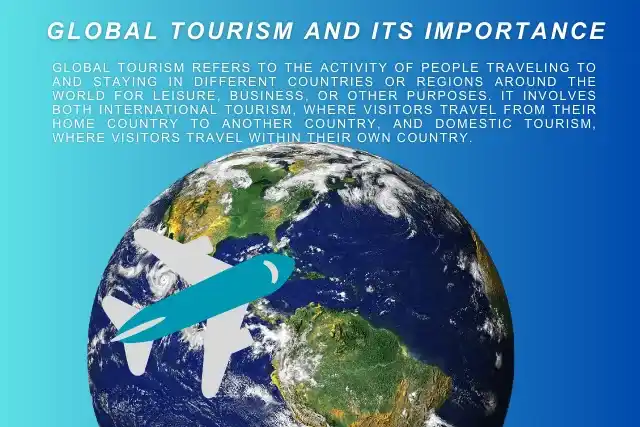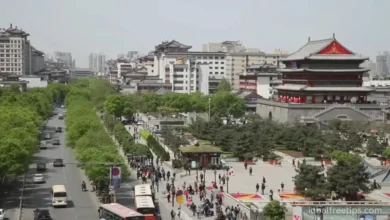
What is Global Tourism and its importance
Global tourism is a massive industry with a significant impact on the economies, societies, and cultures of the countries involved. In this blog, we will explore what global tourism is, how it is organized, and why it is important. We will also discuss some of the challenges and opportunities facing the industry today, and what steps can be taken to promote sustainable and responsible tourism practices. Whether you are a traveler, a tourism professional, or simply interested in learning more about this fascinating industry, this blog is for you.
What is meant by Global Tourism?
Global tourism refers to the activity of people traveling to and staying in different countries or regions around the world for leisure, business, or other purposes. It involves both international tourism, where visitors travel from their home country to another country, and domestic tourism, where visitors travel within their own country.
Global tourism is a significant industry, with millions of people traveling internationally each year. It can have a significant impact on the economies of both the host countries and the countries of origin of the tourists, as well as on the environment, society, and culture of the places visited.
Global tourism can be facilitated by a range of factors, including improvements in transportation, communication, and technology. It can also be influenced by geopolitical factors; such as changes in visa requirements or political instability in certain regions.
Factors of Global Tourism
There are many factors that contribute to global tourism.
- Improved transportation
- Technology
- Economic development
- Cultural exchange
- Natural attractions
- Political stability
- Business travel
- Marketing and promotion
Improved transportation
Advances in transportation, including air travel, high-speed trains, and cruise ships, have made it easier and more affordable for people to travel long distances to reach their desired destinations.
Technology
Technology has made it easier for people to research and plan their trips, from booking flights and accommodations to finding local activities and attractions.
Economic development
As more countries become economically developed, people have more disposable income to spend on leisure activities like travel.
Cultural exchange
Tourism provides opportunities for cultural exchange, as people from different countries and backgrounds interact with each other and share their experiences and traditions.
Natural attractions
Many people travel to see natural wonders, such as mountains, beaches, and wildlife, which can only be found in certain parts of the world.
Business travel
Many people travel for business purposes, such as attending conferences or meetings, which can contribute to the growth of global tourism.
Political stability
Political stability and peace can create a more welcoming environment for tourists and encourage them to visit countries that might otherwise be considered too risky.
Marketing and promotion
The tourism industry is heavily marketed, with countries and regions often investing in advertising campaigns to attract tourists.
How is Global Tourism organized?
Global tourism is organized through a complex network of organizations and stakeholders that work together to promote and regulate the industry.
Governments
National and local governments play a critical role in regulating and promoting tourism within their countries, through policies and regulations related to visas, taxes, transportation, and infrastructure development.
International organizations
International organizations such as the United Nations World Tourism Organization (UNWTO) work to promote responsible and sustainable tourism practices and provide guidance and support to countries and businesses involved in the tourism industry.
Tourism boards
Tourism boards at the national and local levels are responsible for promoting their countries and regions to potential tourists, through marketing campaigns, events, and partnerships with travel companies.
Travel companies
Travel companies, including airlines, hotels, tour operators, and travel agencies, play a significant role in organizing and facilitating global tourism, by providing transportation, accommodations, and other services to tourists.
Non-governmental organizations (NGOs): NGOs play a role in promoting responsible and sustainable tourism practices, and in advocating for the rights and interests of local communities affected by tourism.
Tourists
Tourists themselves are a key player in global tourism, as their choices and behavior can influence the industry and its impact on local communities and the environment.
Marketing and promotion: The tourism industry is heavily marketed, with countries and regions often investing in advertising campaigns to attract tourists.
Why is Global Tourism important?
Global tourism is an important industry with significant economic, social, and cultural benefits. Here are some of the reasons why global tourism is important:
Economic benefits
Global tourism is a major contributor to the global economy, providing jobs, generating revenue, and promoting trade and investment. According to the World Travel and Tourism Council, in 2019, the tourism industry contributed 10.4% of global GDP and supported over 320 million jobs worldwide.
Cultural exchange
Tourism promotes cultural exchange, as visitors interact with local communities, learn about their customs and traditions, and share their own experiences and perspectives.
Environmental benefits
Tourism can provide an economic incentive for the conservation and preservation of natural resources, such as national parks and wildlife reserves.
Education and personal growth
Traveling can be an opportunity for education and personal growth, as visitors learn about history, art, and culture, and broaden their perspectives and understanding of the world.
Peace and understanding
Tourism can promote peace and understanding between different countries and cultures, by facilitating communication, mutual understanding, and cooperation.
Infrastructure development
Tourism can help drive infrastructure development in less developed regions, such as building roads, airports, and public facilities, which can benefit both tourists and local communities.
Job creation
Tourism is a labor-intensive industry that creates jobs in a variety of sectors, such as hospitality, transportation, retail, and entertainment, providing employment opportunities for people of all skill levels.
Investment opportunities
Tourism can provide investment opportunities for businesses and entrepreneurs, creating new markets and stimulating economic growth.
Innovation and creativity
The tourism industry fosters innovation and creativity, as businesses and organizations work to develop new products and services that meet the evolving needs and preferences of travelers.
Improved quality of life
Tourism can improve the quality of life for local communities, by generating income and stimulating economic growth, providing access to services and infrastructure, and promoting cultural exchange and understanding.
Conclusion
Global tourism is a vital industry that provides significant economic, social, and cultural benefits to both the countries involved and the tourists themselves. It is facilitated by a range of factors, including improvements in transportation, communication, and technology, and is organized through a complex network of organizations and stakeholders. While global tourism faces several challenges, such as over tourism and environmental impact, steps can be taken to promote sustainable and responsible tourism practices. By doing so, we can ensure that global tourism continues to provide opportunities for cultural exchange, economic growth, and personal enrichment for generations to come.
You may like:
Responsible Tourism and its Example




